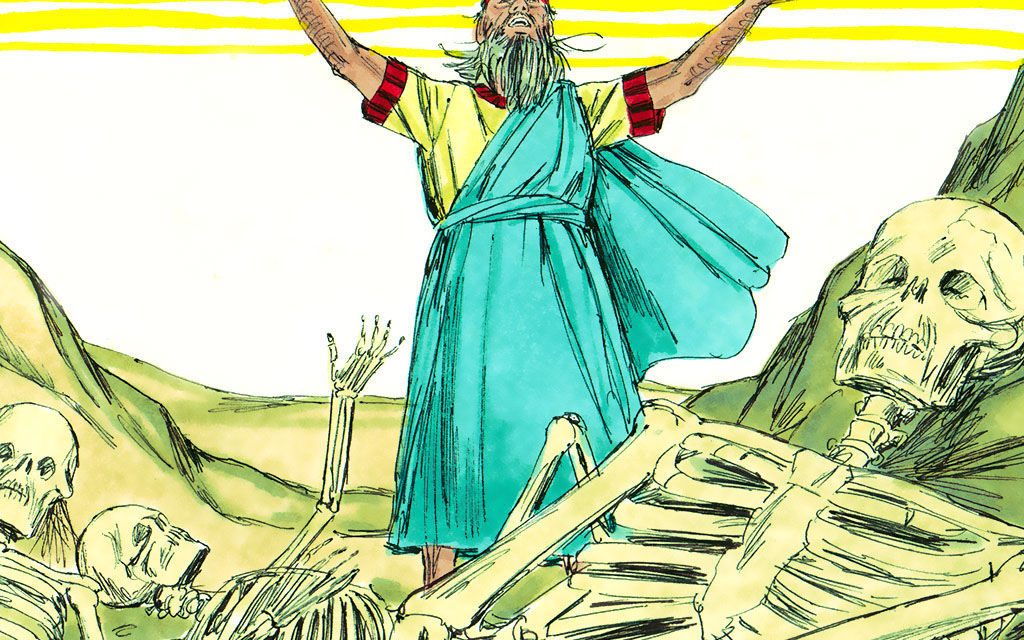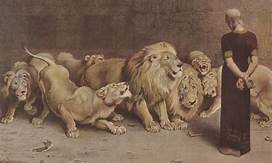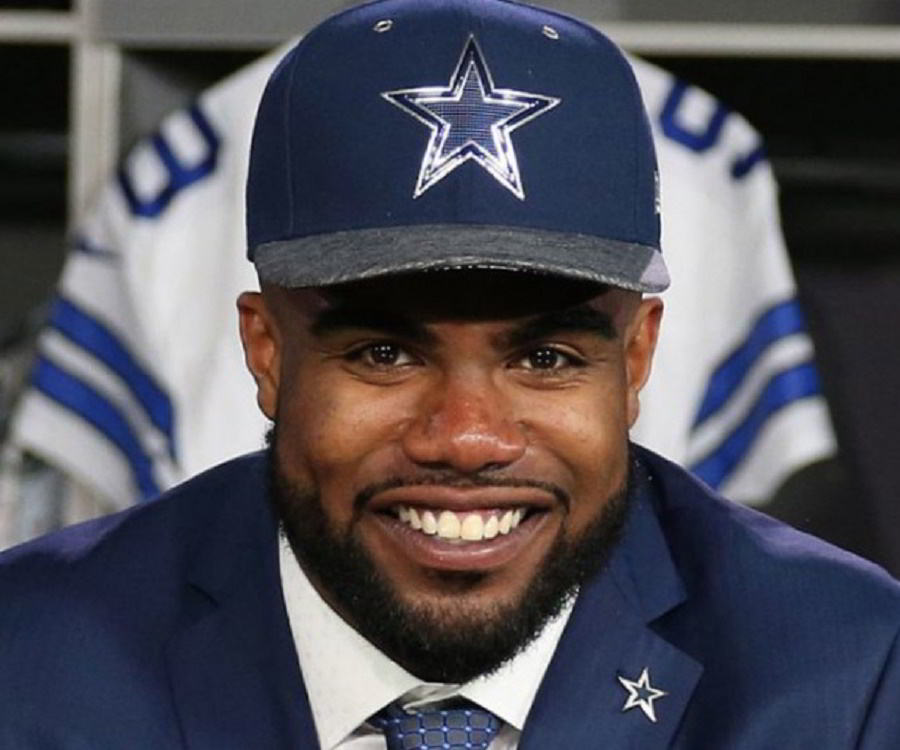You will legitimately be surprised at number one.

As usual, I owe everybody everything. I owe an update on the books I’ve read, I owe another installment of “Sigma Males of the Bible,” I could probably do a post on my writing process. But what I’ve defaulted on in my blog, I’ve paid in revisions on my novel. I’m making progress, maybe in the right direction. But enough about that. As my ranking of the gospels was such a success, and as I’ve just finished reading the book of Jeremiah for the second time, I give you my assessment of the relative strengths of the major prophets.
The major prophets of the Old Testament–Isaiah, Jeremiah, Ezekiel, Daniel–are called major not because they are more important than the other prophets, but because their books are longer. In some cases, much longer. The average length of one of the minor prophets is about four or five pages in my black leather sovereign collection King James Bible, by Thomas Nelson.
The average length of the major prophets is something like fifty or sixty pages. Jeremiah is the longest book of the Bible (not counting Kings, Chronicles, and Samuel, which are each divided into two parts). The major prophets also get very little love, as they are bleak, heavily symbolic, obscure, and there is very little nudity (okay, there is some nudity, but it doesn’t make them easier to read).
However.
Some of these books are highly underrated. All of them are worth your attention. Here’s my assessment.
Number 4: Jeremiah
Jeremiah gets bonus points for having the coolest Hebrew name. Jeremiah is derived from the Hebrew words which mean “Yahweh throws,” or “Yahweh establishes,” or “Yahweh lays a foundation.” And the prose in Jeremiah is great. In particular, I like the passage from chapter 46, concerning Yahweh’s judgement on Egypt:
“Come up, ye horses; and rage, ye chariots; and let the mighty men come forth; the Ethiopians and the Libyans, that handle the shield; and the Lydians, that handle and bend the bow.
For this is the day of the Lord God of hosts, a day of vengeance, that he may avenge him of his adversaries: and the sword shall devour, and it shall be satiate and made drunk with their blood: for the Lord God of hosts hath a sacrifice in the north country by the river Euphrates.” (46:8-10)
Damn! That’s hard as nails.
Jeremiah, at least according to this book, preached in Jerusalem before and after the Babylonians sacked that city. He explains the invasion as a punishment by Yahweh for Judah and Israel’s idolatry.
The reason I rank it so low, is because the book jumps around in time a lot. It moves from vision to vision–like Isaiah, it functions more like a poem than a narrative. That, combined with its length, makes Jeremiah a difficult read.
Number 3: Isaiah
Isaiah’s name is derived from the Hebrew for “Yahweh is Salvation.” In the book of Isaiah, our titular prophet predicts the fall of Jerusalem, and the eventual restoration of the Jews to Zion. It has even less narrative quality than Jeremiah, but it is concerned with a similar topic, and has a somewhat similar apocalyptic tone.
I find the writing in Isaiah to be a bit more striking and unusual than Jeremiah. Especially on the second reading, Isaiah was more–not fun, but powerful, moving. See my earlier post on Isaiah here.
Number 2: Daniel

Daniel is GREAT. Daniel, for many people, would be number one out of these books. I’m tempted to give it that honor. As I’ve explained the derivation of the other prophets names, I’ll tell you Daniel’s as well: God Is My Judge.
Daniel was written relatively late, and it seems to be influenced by other classic Old Testament stories, namely Joseph’s captivity in Egypt. Like Joseph, Daniel is a prisoner of a powerful king (Nebuchadnezzar), and like Joseph, Daniel distinguishes himself with his talent for interpreting dreams. Daniel, however, does Joseph one better.
Where Joseph interprets Pharaoh’s dream of 7 lean cows eating seven fat cows, Daniel interprets a dream that Nebuchadnezzar can’t even remember. I loved this, because it makes Daniel seem like a gifted protagonist, but it also makes Nebuchadnezzar seem totally unhinged for demanding that his seers and advisors interpret a dream that Nebuchadnezzar doesn’t even remember. Who does that?
Daniel is one of the most readable books of the Bible, I believe, because of the influence of other readable Bible stories like the story of Joseph in Genesis, and the book of Esther. It seems like the writer of Daniel took what those books did well, and did it even better. There’s a strong narrative full of narrow escapes and memorable moments.
Who doesn’t know about Daniel in the lion’s den? Have you heard the phrase “the writing on the wall?” That’s from the book of Daniel, where an invisible hand writes, “Mene Mene Tikhil Upharsin” (“You have been weighed in the balances and found wanting”) on the wall of Nebuchadnezzar’s chamber and terrifies everyone. Daniel has Shadrach, Meshach, and Abednego in the fiery furnace.
I particularly love the fiery furnace. The furnace is so hot, it kills the Babylonians who throw the trio of Hebrews into the furnace. But Shadrach, Meshach, and Abednego live. And not only that, but one of the Babylonians tells the king, “The fire didn’t kill them, and when I looked into the furnace, I saw a fourth man in there with them, who’s likeness was as a son of God.” (I’m paraphrasing, as usual.)
That part where they see the fourth man in the furnace gave me chills. You don’t have to believe anything to feel the narrative power of that moment–it almost works on you like a ghost story. Finally, Daniel is great not only because it’s readable and full of classic moments. It also gets weird at the end, when Daniel receives a final prophecy from the Lord:
8And I heard, but I understood not: then said I, O my Lord, what shall be the end of these things?
9And he said, Go thy way, Daniel: for the words are closed up and sealed till the time of the end.
That verse, “O my Lord, what shall be the end of these things?” Gives me chills every time I read it. I’ll point out, too, that an early part of this prophecy is related to the fall of Babylon, as is much of the prophecy of the major prophets. Revelation borrows heavily from the major prophets, both in iconography, in obscurity, and in purpose. None of these books are about the end of the world. They are about the end of empire. In the Old Testament prophets, it’s the fall of Babylon. In the New Testament prophecy, it’s the fall of Rome.
Revelation has a lot of mystique, but it could not have been written without the influence of the major prophets of the Old Testament. Each of the OT prophets is a better book than Revelation. Daniel itself is one of the best and most readable books of the Bible. But it doesn’t take the number one spot on this list.
Number 1: Ezekiel.
Ezekiel comes from the Hebrew words for “God Strengthens.” And… no comment on that.
I’m so proud to put Ezekiel at the top of this list. This book is a deep cut, near the very back of the Old Testament, almost destined to become lost in the dense forest that is the Bible. Many, many people do not like Ezekiel.
Some people say the prose is clunky, or the style is dry. To the prose being clunky, I can sort of see that. Moreover some of the things Ezekiel describes are so strange that they are nearly impossible to render well, and Ezekiel, arguably, fails. But dry? This book is not dry, and there is a slight narrative, with plenty of pathos, to anchor the rest of the book.
Ezekiel is one of the Hebrews taken by the Babylonians in the second group of captives. While in captivity, I presume in a sort of prison camp on the banks of the river Chebar, Ezekiel has a vision of God. The God he sees is so strange it reads like something out of a UFO encounter:
Basically, he sees these four creatures and four wheels, which support this pane of blue glass or something on top of them, and the throne of God sits on top of this pane. This vision reminds me of the Ark of the Covenant: on the ark of the covenant, there are two cherubim, and the spirit of God appears to priests between the cherubim.
It seems like, if we give in to the fiction, and view the Bible as a shared cinematic universe, that Ezekiel sees the real throne of God, of which the Ark of the Covenant is a man-made representation. And the real throne is weirder and grander than anything humans could make, which is why it is so impossible for Ezekiel to describe what he saw.

Then God begins to speak to Ezekiel, and the book just gets weirder. God orders Ezekiel to eat a roll (scroll): “Son of Man, cause thy belly to eat, and fill thy bowels with this roll that I give thee” (3:3). How could anyone call this bad or dry prose? It’s awkward, sure, but to me, the awkwardness is entirely appropriate for this STRANGE subject matter.
God then commands Ezekiel to engage in performance art for the benefit of the other Hebrews in captivity. Ezekiel’s job is to lie on his left side for 390 days. It’s not over after that: he must lie on his right side, then, for 40 more days.
This period of lying down is supposed to represent the captivity of Israel and Judah, a day for a year. (I don’t believe this prediction of length of captivity was correct, but who cares? Have you ever heard a story like this?)
God commands him to bake his bread, during the time of his lying, by burning human poop. Ezekiel protests; God allows him to use cow poop instead.
I mean, I’m sorry, this is the best story I’ve ever heard. Anyone who doesn’t like Ezekiel just doesn’t know a good story when they’re reading one.
Now, I don’t just appreciate Ezekiel because it’s deranged. This absurd task, given at the very beginning of the book, allows us to imagine a real person with pathos. We feel protective of Ezekiel, because not only is he in captivity, but he has to do this terrible job for the benefit of the other Hebrews. He tries to refuse this task, but he can’t.
And because we have a real character completing a task, we have a sort of frame story as context for the long prophetic rant which takes up most of the rest of the book. And what a rant!
You’re probably familiar with the verse Sam Jackson quotes in Pulp Fiction:
“The path of the righteous man is beset on all sides by the inequities of the selfish and the tyranny of evil men. Blessed is he who, in the name of charity and good will, shepherds the weak through the valley of darkness, for he is truly his brother’s keeper and the finder of lost children. And I will strike down upon thee with great vengeance and furious anger those who attempt to poison and destroy my brothers. And you will know my name is the Lord when I lay my vengeance upon thee.”
This is an embellishment of the verse, but an accurate representation of the tone and fire of the book of Ezekiel. In particular, the phrase “You will know I am the Lord when I (insert crazy action here),” is recurring in Ezekiel. Let’s look at the actual Ezekiel 25:17:
“And I will execute great vengeance upon them with furious rebukes; and they shall know that I am the LORD, when I shall lay my vengeance upon them.”
When we think of the Old Testament, we usually think of fire and brimstone and the wrath of God. That’s Ezekiel, along with a healthy does of weirdness, and passages that are outright pornographic:
“For she doted upon their paramours, whose flesh is as the flesh of asses, and whose issue is like the issue of horses” (23:20). Issue, here, means semen. Who on earth could accuse Ezekiel of being dry or boring??
Ezekiel does end in a boring way, as a matter of fact. But in the context of the old testament, the ending makes sense. Ezekiel’s final vision is of an angel with a reed, or a measuring stick. And this angel shows Ezekiel the rebuilt temple of Jerusalem, and measures it all out with the reed. Now this part is difficult to read, but it is a sort of type-scene.
In Exodus, God gives Moses instructions for building the first temple, the tabernacle. These instructions last for pages, and they are dull. Then, the Hebrews build the tabernacle, and the instructions are repeated almost word for word. It makes for a surreal, but difficult, reading experience.
A similar moment in the Bible is Solomon’s building of the second temple, which is a “permanent” structure that stood in Jerusalem. The tabernacle, by contrast, was a huge, portable tent. But Solomon’s temple is described in excruciating detail. Clearly, the construction of the temple, in Kings, is an echo of the construction of the tabernacle, in Exodus. In Ezekiel, also, the vision of the final temple is an echo.
Once you understand that, the boring material makes a bit more sense. It’s a final echo that brings resolution to the story of Israel. What Ezekiel sees is an ideal temple: a temple in the hearts of believers. The final verse is rewarding and stirring, and the whole temple vision provides balance to the ugliness and bombast of the rest of the book.
I see Ezekiel as the quintessential Old Testament book. It has the distilled flavor of all the rest. That is why Ezekiel is not only my favorite of the major prophets, but it is perhaps my favorite book of the Old Testament period. Is it better than Job? Samuel? Deuteronomy? Genesis? I don’t know, but in the interest of being a hipster, I’ll say Ezekiel is my favorite book of the whole Bible.
Leave a comment